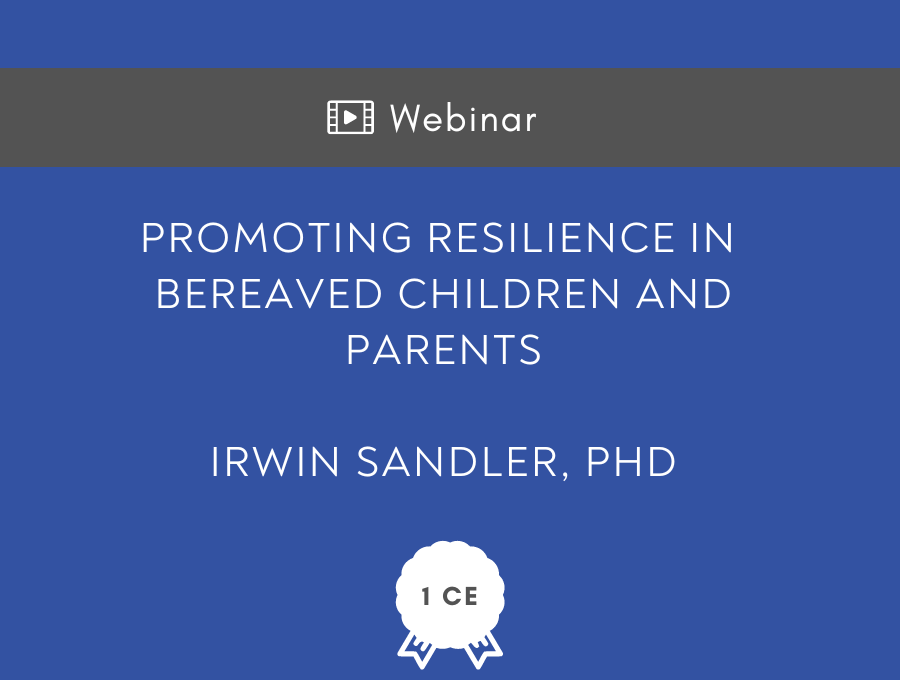
Promoting Resilience in Bereaved Children and Parents – 1 CE Hour
About Course
The Family Bereavement Program (FBP) is a 12-session group program for parentally bereaved children and their caregivers that was developed to strengthen parent level (e.g., positive parenting, parent self-care) and child level (e.g. positive coping) factors that have been found to be associated with better outcomes for bereaved children. A randomized trial of the program demonstrated remarkable effects to improve outcomes, including on complicated grief, depression and suicide risk for both bereaved children and their parents up to 15 years later. Implications for translating the program into a community-based service and how tools from the program might help parents during the coronavirus pandemic will be discussed.Description
The Family Bereavement Program (FBP) is a 12-session group program for parentally bereaved children and their caregivers that was developed to strengthen parent level (e.g., positive parenting, parent self-care) and child level (e.g. positive coping) factors that have been found to be associated with better outcomes for bereaved children. A randomized trial of the program demonstrated remarkable effects to improve outcomes, including on complicated grief, depression and suicide risk for both bereaved children and their parents up to 15 years later. Implications for translating the program into a community-based service and how tools from the program might help parents during the coronavirus pandemic will be discussed.
Recorded on May 8. 2020.
Learning objectives
- List the parent level and child level resilience resources that were targeted by FBP
- Describe the long-term problem outcomes that were prevented by FBP
- Identify ways to translate the program from a scientifically evaluated prototype into a feasible and practical community service
About the Presenter
Irwin Sandler is a Regents’ Professor Emeritus and Research Professor at Arizona State University. Over the past forty years he has been interested in understanding how some children adapt well following exposure to serious stressful events such as the death of their parent. Most recently he has been particularly interested in understanding how bereaved parents can promote resilience of their children. He and his colleagues developed the Family Bereavement Program and the Resilient Parenting for Bereaved Family Program to promote resilience of children who are bereaved due to the death of a parent. His research has been extensively published in over 200 scientific journal articles and book chapters. He has received the outstanding contribution to research award from the Association for Death Education and Counseling as well as many other awards for his research on child and family resilience.
Continuing Education
American Psychological Association
The Center for Prolonged Grief at Columbia School of Social Work is approved by the American Psychological Association to sponsor continuing education for psychologists. The Center for Prolonged Grief maintains responsibility for this program and its content.
Note: Many state boards recognize the APA approval. Please check with your state licensing board.
New York State Education Department
- NYSED State Board for Psychology recognizes the Center for Prolonged Grief as an approved provider of continuing education for licensed psychologists (#PSY-0150).
- NYSED Board for Social Work recognizes the Center for Prolonged as an approved provider of continuing education for licensed social workers (#SW‐0727).
- NYSED State Board for Mental Health Practitioners recognizes the Center for Prolonged Grief as an approved provider of continuing education for licensed marriage and family therapists (#MFT-0080).
Note: Non-NYS social workers, marriage and family therapists, and other licensed professionals, please check with your state licensing board. Many states have recognized our continuing education programs as we are at a CSWE-accredited institution and part of a regionally accredited university.
Course Content
Promoting Resilience in Bereaved Children and Parents
-
Watch the webinar
58:03 -
Take the post-test
-
Post-webinar evaluation
00:00
About the instructors
46 Courses
429 students
8 Courses
0 students
